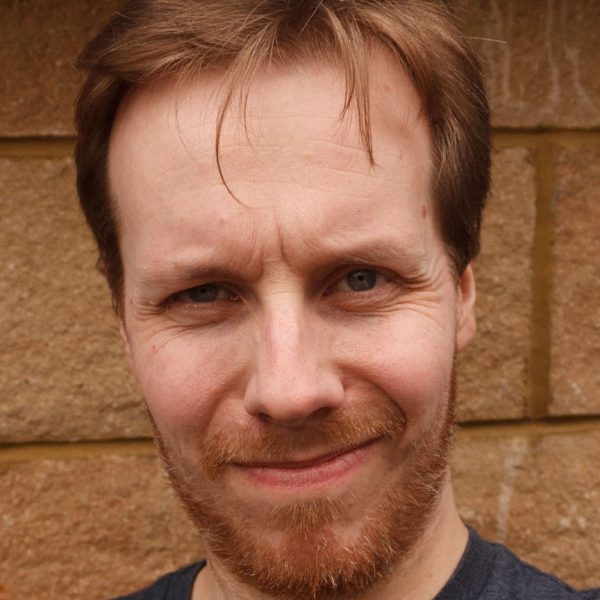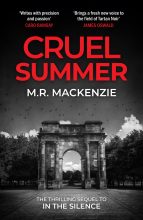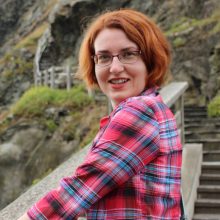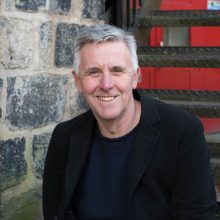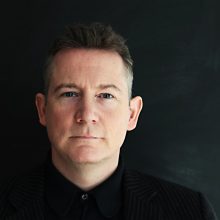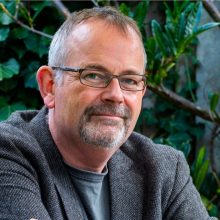Cruel Summer by M.R. Mackenzie
What led you into writing?
I remember, from a very young age, telling people I wanted to be a novelist when I grew up. But, thanks to a less than supportive guidance counsellor at school – who, probably thinking she was giving me valuable career advice, told me hardly anyone made a living as a writer and that I should aspire to become a vet instead – I, as an impressionable eleven-year-old who at the time still thought that adults, for the most part, knew what they were talking about, more or less gave up on the idea, and certainly didn’t consider it something I could entertain as a career.
As a result, I didn’t actually return to writing in any serious way until my mid-twenties. Then, for a number of years, I pursued screenwriting, seeking to combine my passion for telling stories with my love of film. (In fact, my first novel, In the Silence, was originally written as a screenplay.) Ultimately, though, despite making some promising connections and having some positive feedback from submissions to the likes of Channel 4’s 4Screenwriting and the BBC’s Script Room programmes, my big break never materialised, and I initially turned to novel-writing almost by necessity – the logic being that, despite the challenges involved in getting a novel written and published, there are comparatively fewer hurdles to getting it out there than there are to getting your spec script turned into a feature film!
It’s probably somewhat fortuitous, then, that I fairly quickly realised I actually enjoyed writing novels more than I did writing scripts. Something about that expanded canvass, that ability to really get inside my characters’ heads without that constant feeling of a need to hit an arbitrary page count, and (perhaps most of all) the lack of a need to satisfy an army of executives, producers and script editors, really clicked with me, to the extent that I’m extremely happy with where I’ve ended up. I certainly don’t miss having to format everything in 12pt Courier!
How does a typical day look?
I currently juggle two jobs alongside my writing (one part-time salaried, the other freelance and varying in terms of hours from one week to the next), so, as you can imagine, my days can look very different depending on what currently requires my attention. I could find myself with an unexpected free afternoon, which I always aim to make the most of, or it could be that the only writing I get done is during the half-hour it takes me to make the round trip to my day job and back.
When I’m lucky enough to get a full day to dedicate to writing (which tends to mean weekends), I wish I could say I was up at the crack of dawn and cranking out 4,000 words before lunchtime, but the truth is I’m not a morning person at all. I tend to be a late riser and have found, over the years, that I’m at my most productive working from the late evening to the early hours of the morning, when the rest of the world is in bed and I have few distractions. Unfortunately, such a schedule isn’t feasible given my other work commitments, so I tend to compromise and work from late morning to late evening. Really, though, I have no set hours – which I keep being told is bad and that I should get a routine, though so far I’ve proved stubbornly unresponsive to reason.
In what ways do your characters test your abilities?
I tend to write about characters whose life experiences are very different from mine. Believe it or not, I’ve never been embroiled in a murder investigation! I also have a habit of focusing on female protagonists, albeit not through any conscious choice. I just seem to find that the characters who suggest themselves to me tend to be women rather than men, so obviously that’s a somewhat different headspace to get into – though I’ve argued in the past that the barriers to men writing women (and vice versa) aren’t quite as insurmountable as many people seem to imagine. I certainly find it less daunting to write a present-day piece with a female protagonist than I would a novel about, say, a male gladiator in ancient Rome. I’ve written about this conundrum at some length here: https://www.michaelmackenzie.scot/news/whats-in-a-gender/
What’s your setup?

This is my main computer, which doubles up as a fairly souped-up workstation for my freelance job (I’m a Blu-ray/DVD producer for Arrow Video). Really, though, I probably do less than half of my writing at this desk. I work in a library two days a week, and I always take my laptop (the Macbook Pro you see in the corner there) with me. You’d be amazed how productive you can be during a fifteen-minute train ride or a half-hour lunch break – far more so, if I’m being honest, than I often am when I have a whole day stretching out before me. As you can see, I’m not the tidiest of individuals – which is something of a problem as clutter irritates me.
In terms of the software I use, I’m changing it up constantly, partly because I’m a restless type and partly because I keep hoping I’ll find that mythical perfect program. I’ve dabbled with minimalist writing apps like iA Writer and fully-fledged document management suites like Ulysses, but I invariably find myself coming back to good old Microsoft Word. It’s bloated and suffers from feature creep on an industrial scale, but I’ve used it for decades in one form or another, so I’m intimately familiar with all its foibles. And, when it comes to submitting my draft to my editor and then working through their notes, I’m going to be doing that in Word anyway. And, of course, Dropbox is an absolute lifesaver when it comes to chopping and changing between different devices – not to mention the peace of mind that comes from having a comprehensive catalogue of online backups.
What lasting effects have your favourite authors had on your writing and style?
I read more Enid Blyton than was healthy when I was younger, and I’m inclined to credit her with my fondness for writing about amateur sleuths. I find them so much more interesting than professional detectives, possibly because I can relate to the life of a civilian thrust into unfamiliar circumstances in a way that I can’t an officer of the law.
Denise Mina, with her Garnethill trilogy, shattered my preconceptions about what Glaswegian crime was, eschewing hard-bitten, hard-drinking, middle-aged male policemen in favour of characters who were a whole lot more colourful – and more relatable. Her early novels in particular are chock-full of wonderful observations about the human condition and the weird and wonderful characters that exist in everyday life, and I try to capture some of that in my own writing.
Finally, Tana French showed me that crime can be literary. I’m not nearly as good a writer as she is, but I’m constantly inspired by her command of language and her ability to evoke atmosphere with nothing but text on a page.
What do you do for inspiration?
I watch a lot of films – a variety of genres, but I have a real fondness for the Italian “giallo” thrillers of the 70s. I wrote my doctoral thesis on them, and they had a major influence – at least in the early stages – on my debut novel, In the Silence. They almost always feature amateur detectives investigating grisly murders, usually leading to the unmasking of a serial killer whose motive is rooted in a past psychological trauma – sound familiar?
I read ¬– though not as much as I’d like to, or should. Crime, mostly, though I keep telling myself I’m going to diversify.
And, when all else fails, I put on my headphones and go for a walk. If I’m lucky, the change of scenery will result in a flash of inspiration – and, since my memory is like a sieve, the voice memo app on my phone gets heavy use.
What repeating themes do you find yourself pulling into your stories?
As I mentioned above, more often than not I find myself writing about civilians forced by circumstance to solve crimes. “Ordinary people experiencing the worst day of their lives” would be a good way of summing up the sort of stuff I do. My characters also tend to be psychologically damaged in some manner – usually by some past experience that’s shaped who they are in a profound way.
Beyond that, I’ve noticed I tend to fixate on questions relating to power – who has it, who doesn’t, how is it wielded and against whom? I definitely find myself drawn to stories about people who, in one way or another, find themselves in a position of powerlessness – which is perhaps why none of my protagonists have been police officers, because, by the very nature of their job, cops have a degree of power over “ordinary” people.
How do you wind down?
I don’t – not really. I tend to bottle up all my anxieties and unresolved frustrations during the day and then lie awake at night thinking about them. But I’ve been known to play computer games, listen to music, read, watch films… basically everything that allows me to adopt a sedentary position.
What sort of challenges do you regularly overcome while world-building?
Everything I’ve written so far has taken place in the “real” world, so I’m not sure world-building, in the strictest sense, applies to what I do. But I’m big on “plot-building”. In fact, I’m an obsessive plotter. I write vast quantities of notes and construct extremely detailed outlines, to the extent that the full scene-by-scene breakdown that precedes actually writing the prose itself is effectively the true first draft for me. I’m in awe of those writers who are able to start on page one and bang out an entire novel without even a rudimentary sense of where they’re headed. Frankly, I’m not good enough at what I do to freestyle!
What’s the most useful advice you could give to an aspiring author?
I know it’s a cliché, but just do it. The rise of eBooks, self-publishing and independent publishing houses means that the process has been democratised like never before, and there’s never been such a wealth of options for getting your work out there.
I would also say don’t be discouraged by a lack of overnight success. Very few authors shoot to the top of the charts and receive critical acclaim right out of the gate. It takes time to build a profile – I’m only in the early stages of it myself – and it can feel like an uphill climb with the summit nowhere in sight. My long-term goal is definitely to be able to make a living doing this full-time, but until then, I would much rather my work was out there and being read by however many people it can reach – whether that’s a bajillion or just a handful – than locked away on my hard drive being read by no one.
Tell us about the book you’re promoting.
Cruel Summer is the sequel to my debut novel, In the Silence. It’s a highly character-centric mystery told through the eyes of Zoe Callahan, one of In the Silence’s secondary characters. (In the Silence’s protagonist, Anna Scavolini, appears, but in a supporting role.) Zoe’s life is going nowhere and the events of the previous novel continue to hang over her like a dark cloud. So, when her neighbour, an escort, is assaulted by an up-and-coming politician with a spotless reputation, she leaps at the chance to take on a noble cause and bring him to justice, but in doing so gets herself on the wrong side of some very, very bad men.
In a lot of respects, it’s a real change of gears from In the Silence, jettisoning the whodunit template for something more akin to a crime thriller with political overtones ¬– though there’s definitely still a strong mystery element to it. It’s certainly provided me with an opportunity to put some familiar characters into unfamiliar situations, and I think people who enjoyed In the Silence will be excited to see some of their old favourites in a different context, while those who haven’t read the previous instalment have an opportunity to come in fresh with a very different protagonist. Along the way, I explore a variety of complex moral questions relating to extra-legal justice and the limitations of the justice system.
👋 Hi! I run Author Interviews
As a new writer I found myself itching to contribute to a thriving, creative community, so I made Author Interviews and I've met loads of wonderful people in the process. You can buy my debut fantasy RINGLANDER: THE PATH AND THE WAY from Amazon.
